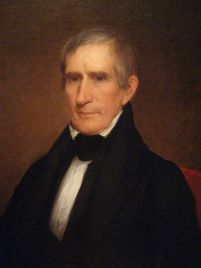First Words: William Henry Harrison, March 4, 1841

The Inaugural Address of William “Old Tippecanoe” Harrison is possibly the most popular and least examined speech of its kind. The story of the address is one of the best (and most morbid) jokes in presidential history: an elderly president, in an attempt to display his youthful stamina, gives an inaugural speech nearly twice as long as any other, catches pneumonia during the address and subsequently dies. Setting aside the fact that it was probably not much of a side-splitter at the time, this post is my attempt to unearth some of the lost substance of Harrison’s speech.
The most obvious attribute of Harrison’s Inaugural is its length. The speech is well over 8,000 words – double that of any other. Harrison’s predecessor, Martin Van Buren, gave a speech of 3,800 words. Andrew Jackson, in his second inaugural address, managed only 1,100 words. Contemporary presidents typically give speeches in the 2,000-3,000-word range. Lincoln’s Second Inaugural, arguably the most examined in history, was only 700 words. So, what message did Old Tippecanoe need 8,000 words to convey?
Harrison took the opportunity to lay out a framework for a more limited presidency – one that scaled back the “monarchical” tendencies of Jacksonian Democracy. The speech is overburdened with references to Roman Emperors and Consuls to illustrate this point. Harrison wrote:
It was the remark of a Roman consul in an early period of that celebrated Republic that a most striking contrast was observable in the conduct of candidates for offices of power and trust before and after obtaining them, they seldom carrying out in the latter case the pledges and promises made in the former. [...] I fear that a strict examination of the annals of some of the modern elective governments would develop similar instances of violated confidence.
To attain the confidence of the public, Harrison described a humbler presidency – one that did not claim to speak for the people, but was made subservient by the trust placed in the office. His views may be entirely alien to “modern” presidents. According to him, the presidency was a profoundly corrupting office whose natural propensity toward patriotism took “possession of the human mind.” Only a constitutional amendment prescribing presidential term limits, he argued, could address that danger. Accordingly, he pledged never to “consent” to serve a second term. (Little did he know...)
Harrison’s speech is not without forewarnings. The first echoes what Washington had said decades earlier: “To me it appears perfectly clear that the interest of that country requires that the violence of the spirit by which those parties are at this time governed must be greatly mitigated, if not entirely extinguished, or consequences will ensue which are appalling to be thought of.” Harrison looked uneasily at the strides made to institutionalize parties. His most poignant warning, however, has a prophetic quality:
The attempt of those of one State to control the domestic institutions of another can only result in feelings of distrust and jealousy, the certain harbingers of disunion, violence, and civil war, and the ultimate destruction of our free institutions.
Twenty years before the American Civil War, Harrison spent 8,000 words extolling the virtues of government not ruled by passions, and warned of the crisis that could occur if the people continued to violently organize themselves in opposition of their fellow citizens. His last public message is the most enduring part of a presidency that is more than a punchline.